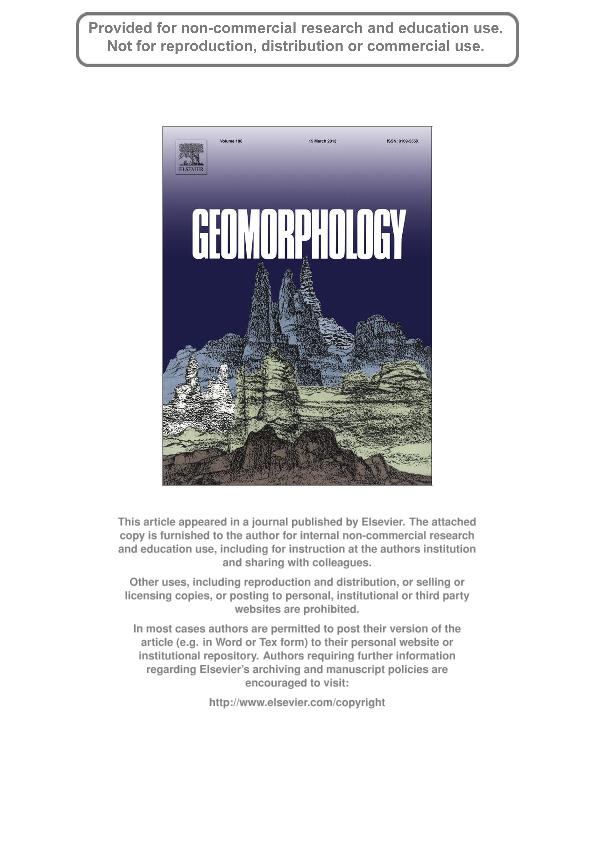Mostrar el registro sencillo del ítem
dc.contributor.author
Penna, Ivanna Marina

dc.contributor.author
Derron, Mark Henri
dc.contributor.author
Volpi, Michele
dc.contributor.author
Jaboyedoff, Michel
dc.date.available
2017-01-17T17:47:42Z
dc.date.issued
2013-03
dc.identifier.citation
Penna, Ivanna Marina; Derron, Mark Henri; Volpi, Michele; Jaboyedoff, Michel; Analysis of past and future dam formation and failure in the Santa Cruz River (San Juan province, Argentina); Elsevier Science; Geomorphology; 186; 3-2013; 28-38
dc.identifier.issn
0169-555X
dc.identifier.uri
http://hdl.handle.net/11336/11466
dc.description.abstract
Around 11.5*10^6 m3 of rock detached from the eastern slope of the Santa Cruz valley (San Juan province, Argentina) in the first fortnight of January 2005. The rockslide-debris avalanche blocked the course, resulting in the development of a lake with maximum length of around 3.5 km. The increase in the inflow rate from 47,000-74,000 m3/d between April and October to 304,000 m3/d between late October and the first fortnight of November, accelerated the growing rate of the lake. On 12 November 2005 the dam failed, releasing 24.6*10^6 m3 of water. The resulting outburst flood caused damages mainly on infrastructure, and affected the facilities of a hydropower dam which was under construction 250 km downstream from the source area. In this work we describe causes and consequences of the natural dam formation and failure, and we dynamically model the 2005 rockslide-debris avalanche with DAN3D. Additionally, as a volume ~24*10^6 m3 of rocks still remain unstable in the slope,we use the results of the back analysis to forecast the formation of a future natural dam.We analyzed two potential scenarios: a partial slope failure of 6.5*10^6 m3 and a worst case where all the unstable volume remaining in the slope fails. The spreading of those potential events shows that a new blockage of the Santa Cruz River is likely to occur. According to their modeled morphometry and the contributing watershed upstream the blockage area, as the one of 2005, the dams would also be unstable. This study shows the importance of back and forward analysis that can be carried out to obtain critical information for land use planning, hazards mitigation, and emergency management.
dc.format
application/pdf
dc.language.iso
eng
dc.publisher
Elsevier Science

dc.rights
info:eu-repo/semantics/openAccess
dc.rights.uri
https://creativecommons.org/licenses/by-nc-nd/2.5/ar/
dc.subject
Landslide
dc.subject
Dan3d
dc.subject
Landslide Dam Failure
dc.subject
Andes
dc.subject.classification
Geología

dc.subject.classification
Ciencias de la Tierra y relacionadas con el Medio Ambiente

dc.subject.classification
CIENCIAS NATURALES Y EXACTAS

dc.title
Analysis of past and future dam formation and failure in the Santa Cruz River (San Juan province, Argentina)
dc.type
info:eu-repo/semantics/article
dc.type
info:ar-repo/semantics/artículo
dc.type
info:eu-repo/semantics/publishedVersion
dc.date.updated
2016-12-12T21:05:59Z
dc.journal.volume
186
dc.journal.pagination
28-38
dc.journal.pais
Países Bajos

dc.journal.ciudad
Amsterdam
dc.description.fil
Fil: Penna, Ivanna Marina. Consejo Nacional de Investigaciones Científicas y Técnicas. Oficina de Coordinación Administrativa Ciudad Universitaria. Instituto de Estudios Andinos; Argentina. Universite de Lausanne; Suiza. Universidad de Buenos Aires. Facultad de Ciencias Exactas y Naturales. Departamento de Ciencias Geológicas; Argentina
dc.description.fil
Fil: Derron, Mark Henri. Universite de Lausanne; Suiza
dc.description.fil
Fil: Volpi, Michele. Universite de Lausanne; Suiza
dc.description.fil
Fil: Jaboyedoff, Michel. Universite de Lausanne; Suiza
dc.journal.title
Geomorphology

dc.relation.alternativeid
info:eu-repo/semantics/altIdentifier/doi/http://dx.doi.org/10.1016/j.geomorph.2012.12.011
dc.relation.alternativeid
info:eu-repo/semantics/altIdentifier/url/http://www.sciencedirect.com/science/article/pii/S0169555X12005600
Archivos asociados
